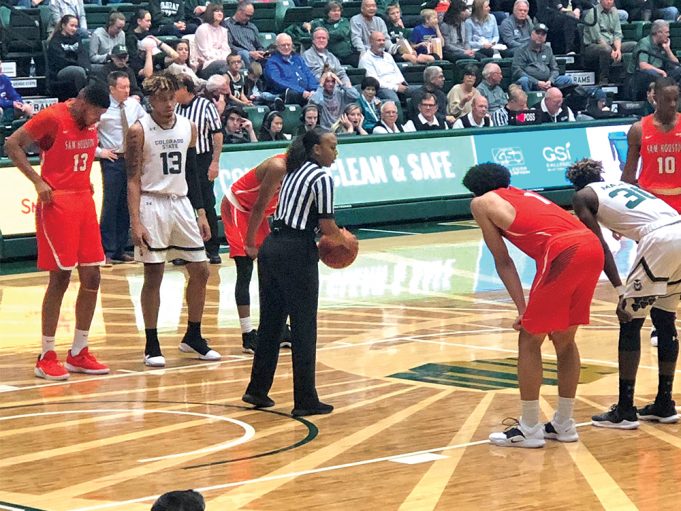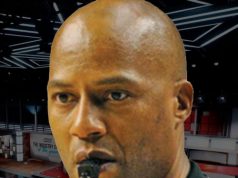Ask Crystal Hogan to discuss her nearly two-decade journey as a basketball official, and she’ll rattle off a long list of names, locations and dates. Some come with a substantial degree of specificity, others are much more generalized.
But nothing compares to the recall that takes place once the name Bobby Dibler is introduced into the conversation.
“And then on Aug. 15 at 1:02 p.m., Bobby Dibler called me,” Hogan said about her first conversation with the men’s basketball officiating coordinator for the Western Officiating Consortium. “I will never forget that time. I will never forget that day.”
That time, that day, is when Hogan realized her dream of becoming an NCAA men’s Division I basketball official — the lone woman who would call games at college basketball’s top level during the 2018-19 season. But before she could navigate the nuances of play calling in the Mountain West, Pac-12 and Big West conferences, among others, she needed to find a way to overcome her emotions and safely navigate her car to the shoulder on a busy Southern California freeway.
“She began to say things to me like, ‘Bobby, I think I’m going to have an accident,’” Dibler said. “I could tell she was getting a little teary-eyed in our conversation. I said, ‘Crystal, you need to pull off to the side of the road first chance you get.’ Quite frankly, I was getting a little teary-eyed, too. I’m kind of an emotional person, and I’m sure that even though we weren’t together, we were sharing a couple of tears together.
“It was an exciting time for Crystal and it was really an exciting time for me, not understanding the depth of what it was that was taking place for me. Quite frankly, we were both kind of caught off-guard.”
That is saying something, because not much catches Hogan off-guard when it comes to officiating.
Right From the Start
A former college player herself as a shooting guard at Compton College and then Long Beach State University from 1997-2000, Hogan first caught the officiating bug two years later after some discussions with fellow Long Beach State student and current NBA referee Kevin Cutler. She was a young, single mother, raising her 1-year-old daughter Taylor, and liked the idea of having a way to stay involved in basketball and make some extra cash.
She jumped into the officiating waters with the Long Beach unit of the California Basketball Officials Association and began an ascent that felt rapid and labored at the same time. Asked to describe that climb in greater detail, Hogan first pointed to her own playing career, offering an insight into why men’s college basketball officiating held such appeal for her.
“I was a tomboy on the court,” she said. “When it came to playing basketball, I preferred playing with boys more than girls. When I started reffing basketball in the high school unit, obviously I was only reffing girls’ games, but I wanted more of a challenge.
“On the court, I was a tomboy. Off the court, it was a dress and heels. I made it a point. As I went along, boys’ basketball became a challenge for me.”
While she made it clear to her assigners that she wanted to work boys’ varsity basketball, she attended various camps to hone her burgeoning skills and to learn three-person officiating mechanics. She was hired in 2005 to work junior college women’s games in Southern California. In 2009, another officiating trailblazer — Violet Palmer, one of the first two women hired as an on-court official by the NBA — gave Hogan her first shot at major college basketball, bringing her on the West Coast Conference women’s officiating staff.
From October through March of every basketball season, Hogan committed herself to be and becoming the best women’s basketball official she could be. However, once the summer arrived, she was pursuing another track.
Drawn to the Drew League
For two years Crystal Hogan spent her offseasons watching high-level basketball officials work the Drew League, the storied Southern California pro-am men’s league where the likes of Kobe Bryant and James Harden have been known to play in the offseason. In either 2007 or 2008 — one of those aforementioned generalized dates that Hogan sprinkles into conversation — the apprenticeship came to an end.
“I sat and watched Kevin Cutler and the other L.A. pro-am guys work for probably two years before my peers pushed me out there, put me on the court and said it’s time for you to ref, it’s time for you to get out here,” Hogan said.
The Drew League paved the way to a three-year stint in what was then known as the NBA Development League. Under the watchful eye of George Toliver, the former longtime NBA referee who was director of referee development for the D-League, Hogan received what she called “the best officiating training that I’ve ever had. … They prepare you for whatever level that you’re trying to get to.”
Hogan never received a promotion to the NBA, but her efforts to work top-flight men’s basketball were far from over. She stuck with the Drew League, determined to continue to make the men’s game the focus of her future.
“We’re surrounded by NBA players, we’re surrounded by top college players, we’re surrounded by players who will challenge you, coaches who will challenge you,” Hogan said. “Just doing that every year, and my peers in the L.A. pro-am officiating family, it definitely helped me to where I am now.”
Fast forward to the summer of 2018, after several years of what had become a familiar cycle of women’s college basketball games each winter and Drew League games each summer. All of that “offseason” training, the summers spent away from her daughter, the willingness to put her continued officiating education in the hands of her Drew League peers and the players and coaches who populated its courts, was about to pay off.
Veteran NCAA men’s basketball official Donnie Nunez paid a visit to the Drew League, and Hogan caught his eye. Nunez reached out to Dibler, and Hogan found herself with an invitation to the evaluation camp Dibler operates in conjunction with a major AAU tournament each July in Las Vegas.
Leaving an Impression at Camp
Hogan was the lone female in a class of two-dozen referees hoping to make a favorable impression on the several NCAA men’s basketball officiating coordinators in attendance at the camp.
“I was not focused on finding a female to become a Division I men’s basketball official,” Dibler said. “We have had female referees at the Vegas camp over the past several years. … We’ve had some really good female officials attend the camp in Vegas each year.”
But none proved ready to break the glass ceiling. That was about to change. As part of the camp evaluation process, Dibler has a leadership team including four other people, and he also brings in six of his top officials from his consortium to observe and evaluate. As fate would have it, those 11 sets of eyes found themselves fixated on one of the camp’s more challenging games when one particular official made a favorable impression.
“You never know when the game is going to be played that is really an extremely difficult game to officiate. The talent level is very high,” Dibler said. “In this particular game, unbeknownst to any of us, Crystal was one of the officials on that crew, and it was a game that really needed somebody to step up and kind of take maybe the lead role as one of the three officials to make sure the game was managed and officiated properly. … And it just so happened that Crystal was the one who stepped up and took care of business, and immediately because of that, caught the eye of myself and several other people who were in attendance.
“From that point forward, we all began to be a little more attentive to Crystal and her skill set on the floor.”
According to Dibler, to a man, each of the six top-flight officials whom he invited to observe and evaluate relayed to him the same sentiment: “Bobby, if you’re going to make a decision and Crystal is the one you’re thinking of, just know that I’d be more than happy to work any game that you want to give me with her.” One of those officials, Verne Harris, coordinates officials for the NCAA D-II Rocky Mountain Athletic Conference (RMAC), and pulled Hogan aside immediately following the camp’s conclusion and offered her a spot on his roster.
The dream of working men’s college basketball was alive. It would take a bit more time for it to ascend to yet another level. Hogan left Las Vegas having not even spoken to Dibler.
“Obviously I got good feedback from all the top veteran officials, and my peers enjoyed working with me, so I got good feedback from the camp,” Hogan said. “But in this business you just never know. You just go out there and work your hardest and stick to your training and you hope for the best, and that’s kind of what I did.”
The Hiring Call
Little did Hogan know that her hard work, hope and patience were already in the process of being rewarded.
“I’m older. I’m a slow mover. I pondered it and thought about it. I just didn’t say, ‘Crystal, come join our consortium next year.’ It was a number of weeks after that before I finally invited Crystal,” Dibler said. “Let’s be honest — Crystal is a female. We don’t have any females in the consortium who are officiating with us. I didn’t think of it as an historic move or anything like that, but I wanted to make sure it was the right decision. I thought about it and deliberated about it for several weeks.”
Those deliberations resulted in the Aug. 15 call. Hogan had finished her shift as a parole agent for the state of California, her career for the past decade following a stint as a children’s social worker for Los Angeles County, and had stopped by her mom’s home. The only other thing she remembers, other than the exact time of the call, is that she was on busy State Route 91, otherwise known as the Riverside Freeway, and was on her way to her Orange County home when the phone rang.
“Bobby Dibler called me and invites me to work in his consortium,” Hogan said. “Not only did he offer to hire me in his consortium, he hired me in all six of his conferences.
“For me, that was a testament of everything that I put into officiating, which is my passion, for officiating men’s basketball — it all paid off that day.”
The timing could not have been better. Hogan’s constant companion throughout her officiating journey, her daughter Taylor Thomas, graduated from high school last spring and, armed with a scholarship provided by the Drew League Foundation, headed to Hampton University in Hampton, Va., where she is a member of the school’s cheerleading squad.
“I’m still a mother. I’m always a mother, but I have the time to actually really focus and travel and do everything that’s expected of me as a men’s Division I official,” Hogan said.
And a busy schedule it’s been. In her last season calling NCAA women’s action in 2017-18, Hogan worked D-I games in the Big West Conference and D-II games in the California Collegiate Athletic Association. As a men’s basketball official, Hogan spent the 2018-19 season working D-I games for Dibler in the Big Sky, Big West, Mountain West, Pac-12, Western Athletic and West Coast conferences, D-II games for Harris in the RMAC, and junior college games for Jerry White in the Western State Conference.
While Hogan would not disclose her exact number of games worked this past season, Dibler offered that he eased her into her D-I responsibilities with approximately 15 games, primarily of the non-conference variety.
Getting the Job Done
“Crystal Hogan was very well received,” Dibler said. “You go out and you perform and you do your job and you deliver the results, which is to go out there and get in the right position to make the right calls during the game. Frankly, everything was positive. I couldn’t be more proud of her.”
As it turned out, being the lone woman on a nationwide officiating staff came with few challenges. NCAA Division I universities are already quite familiar with meeting the needs of mixed-gender officiating crews on the women’s side of the game, and simply employed the same accommodations and protocols for the men’s games to which Hogan had been assigned. The baptism by fire that one might expect a female official to face in a world of powerful, egocentric men fueled by testosterone and million-dollar coaching contracts turned out to be relatively flame free. And she found a comfortable, welcoming acceptance from her partners in stripes.
The key to all of it, Hogan believes, is communication.
“Everybody can call a thousand violations, but communication, professionalism, respect … I think that is key in this game. If you don’t have that, you need to get it,” Hogan said. “I think me working in corrections has helped tremendously in being successful at this level because communication is key. If you can’t communicate with your partners, your peers, your coaches, your players, if you can’t communicate effectively, that can be a problem.
“I think the fact that I am a parole agent, the fact that I grew up in Compton, the fact that I am a mother, I’ve had a lot of practice with trying different things out to be an effective communicator. I think it’s helped me a great deal this season and in the past. Just being able to communicate and not afraid to make mistakes. I think that’s been the biggest thing for me this year.”
J.D. Collins, the NCAA’s national coordinator of men’s basketball officiating, had the opportunity to observe Hogan during her inaugural season. He praised her work as a D-I men’s basketball officiating rookie and also lauded Dibler for taking the step to bring her into the fold.
“I think it’s fantastic,” Collins said. “Our job is to find officials. It doesn’t matter if they’re female, black, white, brown. What matters is, can they officiate? … I’m happy for Crystal. I’m happy for the leagues using her to officiate, that she has this opportunity.”
Collins also cautioned that Hogan’s success story is far from completed. While bringing a woman onto the NCAA D-I staff is a major shift in the landscape, what is important moving forward is allowing Hogan to successfully transition from being a first-year official into an experienced veteran, and allowing the novelty of her gender to wear off.
“I think one of the things we need to do is give her space, give her space to grow and learn,” Collins said. “She deserves the same amount of space that other first-year men’s officials deserve.”
As Hogan gains her foothold in the men’s game, the next logical question to ask is, now that she has broken down the door, will there be a line of female officials ready and able to charge through? The NBA made big news early during the 2018-19 season when it added two women, Ashley Moyer-Gleich and Natalie Sago, to its full-time officiating staff, joining Lauren Holtkamp, who had been the lone woman in the NBA ranks. Could the same be in store for the NCAA men’s basketball officiating staff?
“I don’t know the answer to that,” Dibler said. “I don’t know the direction that any other Division I leagues are thinking about. I have had some discussions with Gloria Nevarez, who is now the commissioner of the West Coast Conference (and previously worked for the Pac-12). She and I have had discussions from time to time about the possibility of bringing a female onto the men’s side, but nothing that was a focal point or anything that we must make that happen.
“I can’t say that this is a focus or a move that others will be making. I don’t know. But it’s worked out really well for the (consortium).”
Likewise, Crystal Hogan doesn’t profer any clairvoyance about her own future, other than her desire to continue to work on her craft. She’s looking forward to returning to the Drew League this summer — “I will work the Drew League until I am 90 years old if I can” — and, asked to forecast where she might be in 10 years, offers a list of three simple goals.
She wants to continue to grow and improve as an NCAA men’s basketball official. She wants to work the NCAA tournament.
“I also want to motivate other women to pursue men’s basketball if it’s their passion. I think that opportunity will be available to them,” Hogan said.
“I just want to open up a pathway for opportunity. I want to be a role model for little girls and encourage them to dream big, and then when they dream big, make those dreams a reality. Don’t be afraid to make those dreams a reality.”
What's Your Call? Leave a Comment:
Note: This article is archival in nature. Rules, interpretations, mechanics, philosophies and other information may or may not be correct for the current year.
This article is the copyright of ©Referee Enterprises, Inc., and may not be republished in whole or in part online, in print or in any capacity without expressed written permission from Referee. The article is made available for educational use by individuals.


















